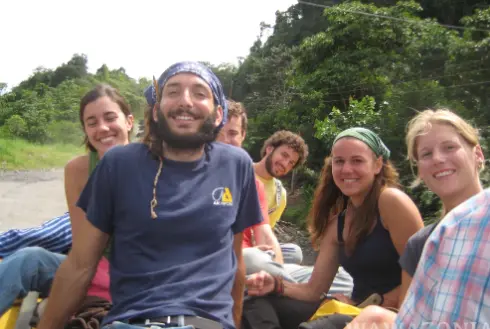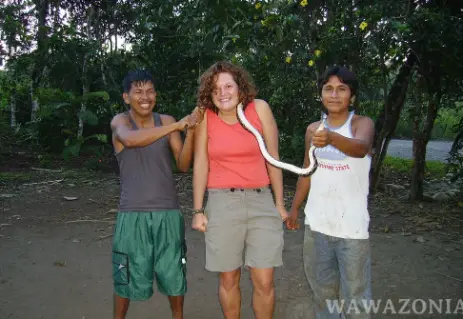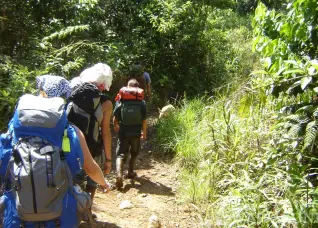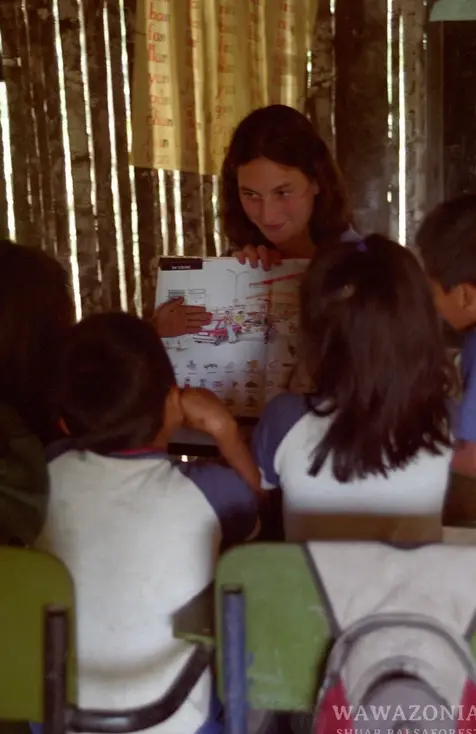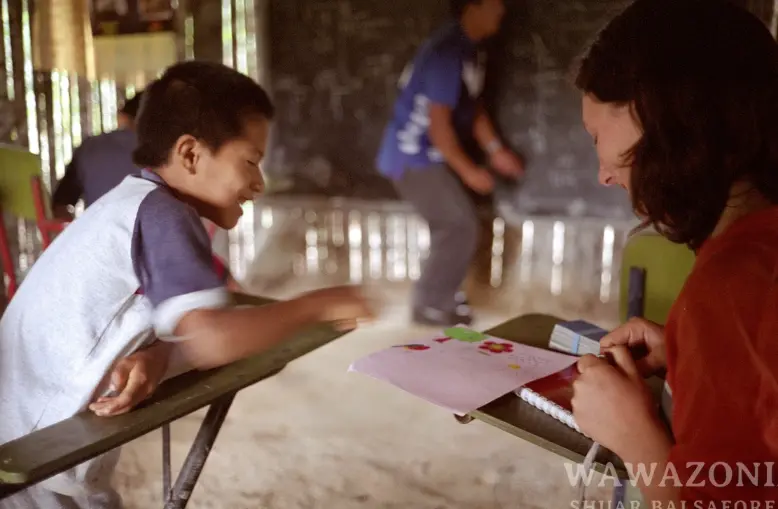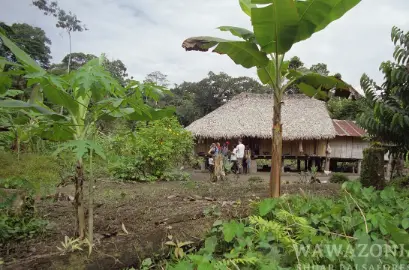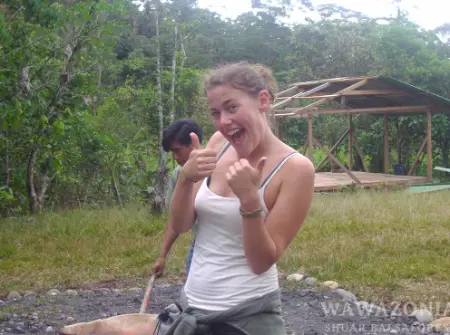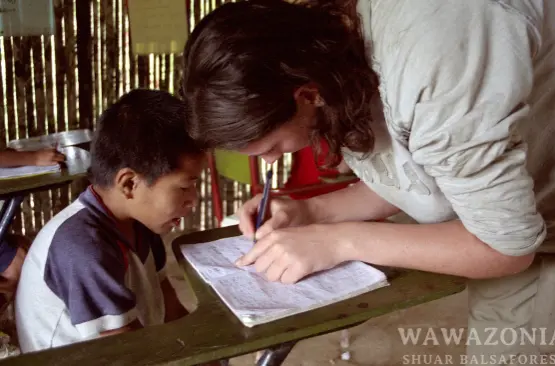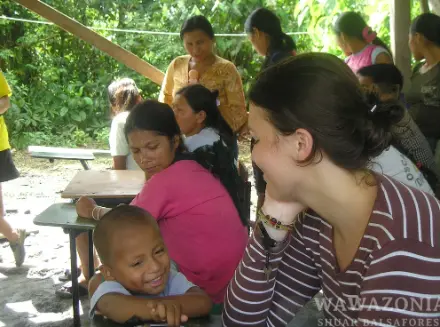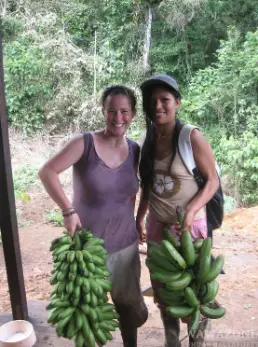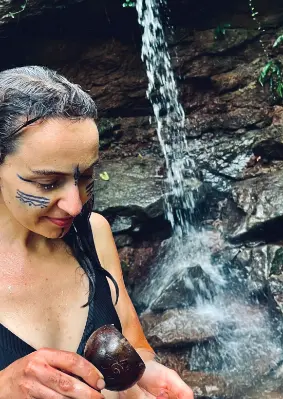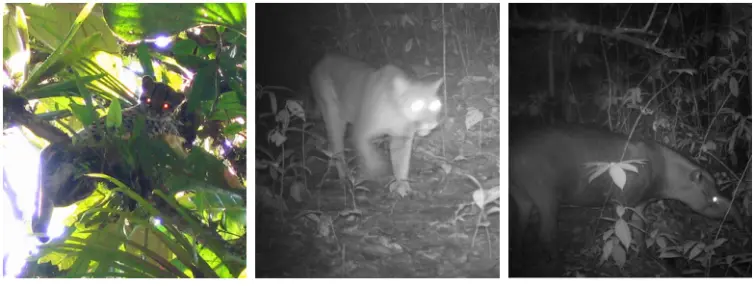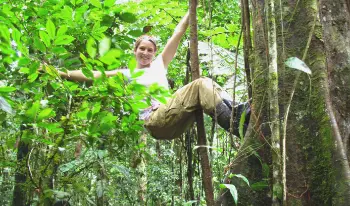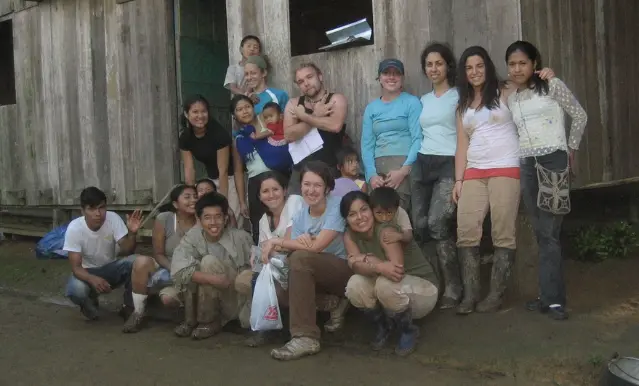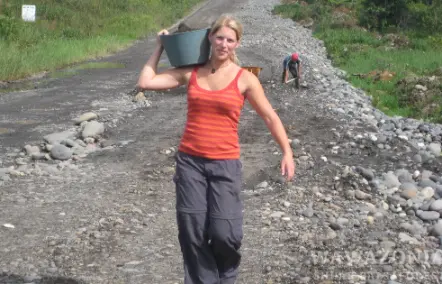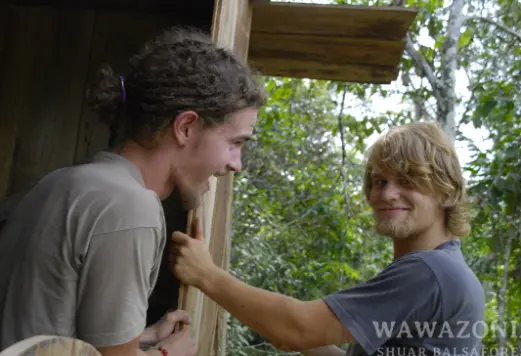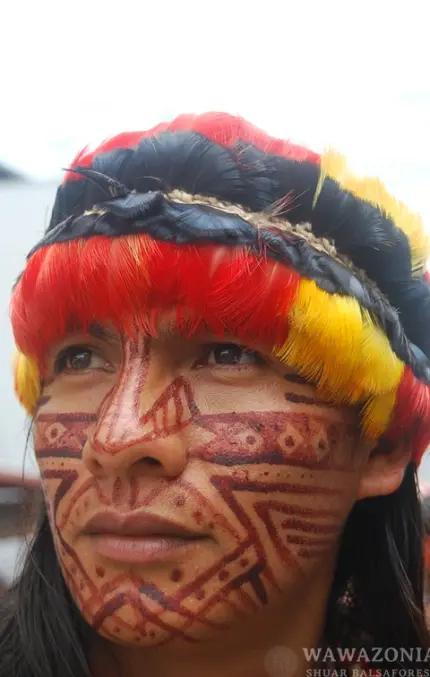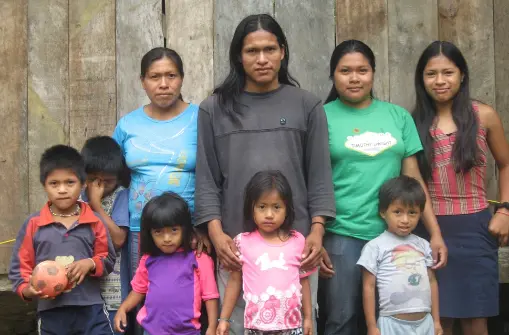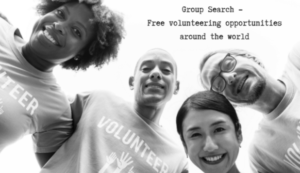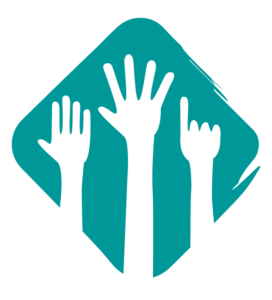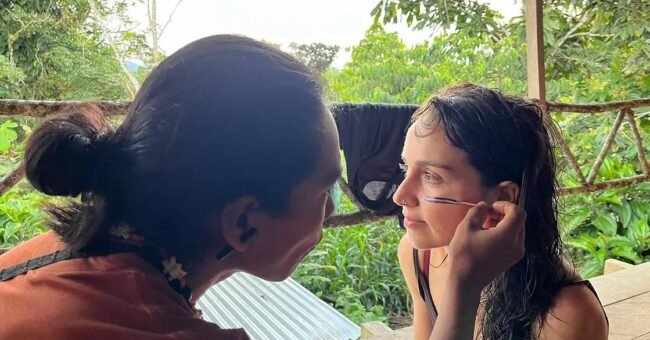
If you want to learn about other cultures and protect the Amazon rainforests, an adventure awaits you with the Wawazonia project.
![]() Wawazonia volunteer project –We offer volunteer placements all year round to people who actively want to engage in community development, conservation, and experience the Amazon, as well as learn about the life of the Shuar and Kichwa people.
Wawazonia volunteer project –We offer volunteer placements all year round to people who actively want to engage in community development, conservation, and experience the Amazon, as well as learn about the life of the Shuar and Kichwa people.
For us, volunteering is not just about the work.
It is also a cultural exchange and an opportunity to learn about indigenous culture, and volunteers are invited to participate in all community activities. You will also be allowed to visit other Shuar and Kichwa communities in the surrounding forest and explore the amazing rainforest located right next to the communities.
Wawazonia differs from many other volunteer projects by being managed entirely by the local indigenous Shuar and Kichwa. Our boards of directors and staff are from the local communities. The vision is to achieve long-term sustainability of the projects by securing full ownership to the indigenous communities and gaining the capacity from administrating the projects.
However, building sufficient managerial skills is a long-term process for subsistence farmers. In this process, volunteers are considered a crucial part of exchanging ideas and knowledge with the villagers and providing suggestions for improving the projects and general development of the indigenous communities.
The purpose of the volunteer program is to strengthen the projects with personnel, ideas, and new ways to create community development in our partnering communities of Pastaza based on the sustainable use of biological resources and cultural norms.
What category best describes your hosting arrangement? 🏡
- Community/Eco-village
Location – Where is your volunteer project located?🌏
Our project is located in Ecuador, specifically in the community Arútam in the Pastaza Province.
What are you looking for help with?
- Farming/Gardening 🌿🐄
- Film-Making 🎥
- General Help 💁♀️
- Marketing 📈
- Research 🔬
What’s the mission of your community? 🎯
Project Wawazonia aims to generate income among the villagers of the Shuar communities through investment in the sustainable production of native tree species such as balsa (called Wawa in Shuar) and other local timber species. In addition, establishing and managing these new buffer plantations and balsa forests will provide employment and enable the Shuar to say no to pressure from illegal loggers.

Furthermore, by producing the balsa and tropical timbers in plantations on previous farmland, the demand for wood is concentrated on a lesser area than current practices, creating a buffer for the undisturbed primary forest, thus eliminating the need for cutting balsa and other timbers in the primary forest.
The project will also establish a Shuar-led Climate Fund that will invest in sustainable economic activities in the villages, such as tourism, craft production, fish farming, and the like.
Expected results
- To establish 200 hectares (225.000 trees) of sustainable plantation in five indigenous Shuar communities.
- To protect 1000 hectares (10.000.000 sq. m) of primary rainforest in the five communities.
- Create jobs related to the production and management of plantations and conservation areas.
- Market and sell sustainable balsa and timber from the plantations no later than five years after the establishment, combined with skills and general education about sustainable forest management.
- Carbon capture through plantation establishment and standing biomass in the primary rainforest. One hectare of forest plantation in the area captures 30 tons of carbon per hectare per year, which donating companies can purchase.
- Establish a Shuar-led climate fund. The fund will receive DKK 1 per tree planted and 5 per cent of the profit from the sale of balsa wood. The fund will support sustainable development in the communities, such as ecotourism, women’s group activities, craft production, the development and sale of traditional medicine, and much more.
Volunteers’ age restrictions 🔞
We can host volunteers of all ages (senior volunteers and minors are welcome) 💪
You will be living in a rural setting in an indigenous community, so minors must be accompanied by adults.
How many volunteers could you host? 🎎
- Up to 10 volunteers
When do you usually need volunteers? 📅
- All year round
How many hours of help per day? ⏱
- 4-5 hours of help per day
How many days of help per week? 🌒
5 days per week – 2 days off
Note about the volunteer work and other expectations 📝
There are no specific skills required to participate in the program.
Those who have a passion for assisting others, a flexible and positive attitude as well as capability to live under basic conditions can join the project. There are no age restrictions but young and elder volunteers should note that they will be living in tropical conditions with basic facilities.
Volunteers under 15 years old have to be accompanied by their parents.
There are no Spanish-level requirements for volunteering.
Are accommodation and food included? 🏠🍜
We ask a daily/weekly fee for the food.
What type of accommodation can you provide? 🏕
- Private home 🏠
Volunteers live in one of the five Shuar and Kichwa communities that form the Wawazonia project. Volunteers are accommodated with a local host family in the community. The host family houses have private rooms, bathrooms, toilets, etc. The host family prepares the meals, but volunteers are invited to help with the cooking.
Diet – nutrition information 🥗🥤
Volunteers will be provided with three meals per day and free drinking water. Furthermore, biscuits, sweets, beers and soft drinks can be purchased in a small shop in the community. Meals
consist of a traditional Shuar/Kichwa diet supplemented with rice, pasta and vegetables. The main stables are manioc, plantain, sweet yam, rice, pasta, vegetables, chilli and meat. Another stable part of the diet is the chicha.
Vegetarians can be accommodated.
Fee transparency 🆓🔍
Volunteers pay a program fee according to the number of weeks they will stay. The program fee includes accommodation in the community, three meals a day, the coordination, organization, and support during the volunteer program. There are no mandatory expenditures besides the program fee. There might be smaller costs associated with trips to other communities. However, such trips are optional and normally arranged during weekends participation is not required. There is also a small shop in the community where it’s possible to buy beers, coca colas, biscuits and candy etc.
- 2 weeks 250 USD
- 3 weeks 300 USD
- 4 weeks 350 USD
Hereafter each additional week is 75 USD
VISA SUPPORT – Are you able to assist with visa support, information, or provide invitation letters? 🛂
Yes, we can help with Visa/invitation letters ✅
Wawazonia Volunteers’ benefits 🏆🏅
We provide volunteer certificates and:
- A unique cultural experience living in Indigenous communities
- Knowledge and opportunity to explore the Amazon Rainforest for free
- Language skills (Spanish)
- Insight into community development and conservation in the Amazon Rainforest
What are the available activities during free time? 🚴🚣🦒
- Explore the rainforest
- Participate in community activities
- Visit other tourist attractions in the region
Language 🗣🇬🇧
Spanish – There are no Spanish-level requirements for volunteering. We receive volunteers without any previous Spanish skills to volunteers with advanced Spanish skills and native Spanish speakers. Basic Spanish skills and active effort to learn will, however, improve your experience as the working language is Spanish and villagers speak little English. That way the project is also a great way of enhancing your Spanish skills.
Villagers are bilingual with Shuar as their first language and Spanish as the second – some understand basic English. All villagers are both fluent in Shuar and Spanish. The working language is Spanish, but villagers will often talk Shuar among each other.
Villagers are very keen on teaching Shuar to any volunteers interested.
Geography 🌳
The best way to categorize the weather in the region is that it is warm, humid and unpredictable.
Located at latitude 1.75ºS, Arútam is located only 190 kilometres south of the equator. This means that there are little seasonal changes in rainfall and temperature as well as the length of the day. The sun gets up around 6 am and goes down 12 hours later. This only varies 30 minutes around 6 am and 6 pm during the whole year. The temperatures are high but vary quite
a lot even within the reserve.
Day temperatures are high and around 27ºC /80ºF. This varies very little throughout the year. Night temperatures are normally around 15 to 21ºC / 60 to 70ºF. This can, depending on wind conditions and rain feel somewhat cold when you have gotten accustomed to the tropics, and it is a good idea to bring a long-sleeved sweater, trousers and a sleeping bag.
Wawazonia Medical recommendations
Check with your local doctor at least three months before departure on what vaccinations are recommended.
The risk of malaria and other contagious diseases in Arutam is quite low.
There have been no documented cases of malaria in the community. However, there have been a few cases of malaria in the region, and malaria tablets are recommended. In general, most travellers will sometimes experience stomach problems when travelling in a foreign country. Although conditions are simple in the communities, hygiene is good, and there are few cases of diarrhoea in the community. However, some volunteers get sick (diarrhoea) when they leave the community on personal weekend trips to nearby Baños. So try always to drink bottled water and avoid exotic street food.
A recommended piece of equipment is the LIfeStraw bottle that filters water.
The nearest town with normal commodities, internet, international calls, hotels, restaurants, hospitals, etc, is Puyo, which is located 47 km from Arútam. The trip to Puyo takes around 1 hour by bus, and there are several buses every day. The popular town of Baños is only 3 hours away from Arútam, and some volunteers go there on weekends.
Flora and Fauna
The surrounding rainforest near our communities contains some of the world’s highest levels of species richness. Most flora and fauna are harmless. Although both pumas and jaguars have been recorded close to the village, none of these big cats are known to be man-eaters.
Some insects (especially ants) can be annoying and painful as they can both bite and sting but are rarely dangerous. The best rule is never to touch insects (or other animals) unless villagers tell you that it is safe. Although tarantulas are big and scary-looking, they are not harmful if left alone. A good rule is always to check your boots before putting them on.
You will likely encounter snakes if you stay a couple of weeks in one of our communities. Although only a few are dangerous, we always recommend that volunteers take the general precautions of watching where you step and put your hands. Always wear rubber boots when walking in the forest and use a flashlight when walking at night.
How to get to your site ✈ 🗺
WAWAZONIA has its main activities in the Arutam community.
The community is situated in the Pastaza province of Ecuador. To get there you must take a bus from Quito (or anywhere else in Ecuador) heading to Puyo (the provincial capital of Pastaza). The trip takes about 5 hours. From Puyoyou you need to take a bus heading towards Macas. You have to get off the bus on the way to Macas (approximately 1 hour from Puyo). Tell the driver to drop you off at kilometre 47 (“kilometroquarenta y siete”) on the Puyo-Macas road or at Arútam (Bosque Protector Arútam). The community is situated next to the road.
Details of how to get to any other of our communities are provided when getting to Arutam.
Is there internet access? 🌐
Yes!
“Paying guests” Option. Could you accommodate “solidarity” tourists? 🎎
Yes, we can accommodate eco/responsible tourists & paying guests 👌
CONTACT DETAILS 🔍📧
You can get more information on Wawazonia Official Website
Or contact our coordinator by email info@shbnature.com
Wawazonia Facebook page
Wawazonia is also on LinkedIn
Hostname 📛WAWAZONIA

